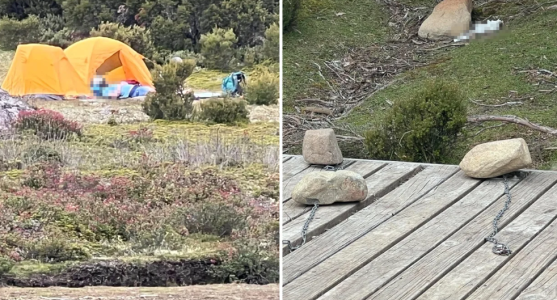Hiking Horror: Learn the Disturbing Discovery in Our National Parks That Has Australians Outraged!
By
Gian T
- Replies 0
Australia's national parks are renowned for their breathtaking beauty and pristine wilderness, offering a sanctuary for nature lovers and outdoor enthusiasts. However, a recent and rather unsavoury issue has been tarnishing the natural splendour of these cherished spaces, leaving many Australians both outraged and concerned.
The problem at hand is one of human waste being improperly disposed of along walking tracks and camping sites, creating not only an unpleasant sight and smell but also significant health and environmental risks. This 'putrid' act, as it has been described, has been increasingly reported across various states, with authorities noting a worrying rise in the number of people defecating in the bush.
In an effort to combat this issue, Queensland National Parks have begun issuing $464 fines to tourists caught leaving their waste inappropriately in the wilderness. Despite these measures, the problem persists, with Tasmania's rangers reporting an 'unprecedented' amount of human feces near rivers, lakes, streams, and even adjacent to toilet facilities.
The situation reached a tipping point over a recent weekend when a hiker visiting the Walls of Jerusalem National Park in Tasmania's central highlands encountered 'very inconsiderate and tasteless behaviours' at the Wild Dog Creek campsite. The hiker's online post detailed the presence of used toilet paper and fresh eggshells littering the ground, presumably left for park rangers to clean up.
This issue has sparked a chorus of disapproval from the hiking community, with many calling for stricter enforcement and fines to deter such behaviour. The sentiment is clear: people are baffled by the thoughtlessness of those who seek out the beauty of the environment only to defile it with their waste.
In response to the growing concern, the Tasmania Parks and Wildlife Service (PWS) has taken steps to improve facilities, including installing new toilets at the Walls of Jerusalem National Park and upgrading walking tracks and campground platforms. However, many tracks in Tasmania are remote and lack formal toilet facilities, which poses a challenge for waste management.
PWS has urged visitors to plan their trips carefully, be aware of available facilities, and use them when provided. In areas without toilets, hikers are encouraged to adopt a Leave No Trace approach, which includes using 'poo pots' or 'poo tubes' with fully biodegradable compostable bags. For those who must bury their waste, it is advised to dig a hole at least 15 centimetres deep and at least 100 meters away from water sources, ensuring that the waste is well covered. All toilet paper and sanitary products should be packed out, as they are not biodegradable.
The environmental impact of improper waste disposal is significant. Human feces can damage plant life, encourage the growth of invasive weed species, and have a lasting effect on untouched landscapes, many of which are part of world heritage areas.
For years, bushwalkers have been encouraged to bury their poop responsibly, but it seems that the message is not reaching everyone. Olivia Hickey, a Tasmania Parks and Wildlife ranger, has pointed to inexperienced bushwalkers and tourists as part of the problem, noting that rangers often have to transport waste found in the wilderness to proper disposal facilities.
The situation in our national parks is a stark reminder of the importance of responsible outdoor behaviour. As we enjoy the wonders of Australia's natural landscapes, it is crucial that we do so with respect and consideration for the environment and future visitors. Let's all do our part to keep Australia's national parks clean and beautiful for generations to come.
 We invite our readers to share their thoughts and experiences on this issue. Have you encountered similar problems while enjoying the great outdoors? What solutions do you think could help address this issue? Share your stories and ideas in the comments below, and let's work together to preserve the natural beauty of our national parks.
We invite our readers to share their thoughts and experiences on this issue. Have you encountered similar problems while enjoying the great outdoors? What solutions do you think could help address this issue? Share your stories and ideas in the comments below, and let's work together to preserve the natural beauty of our national parks.
The problem at hand is one of human waste being improperly disposed of along walking tracks and camping sites, creating not only an unpleasant sight and smell but also significant health and environmental risks. This 'putrid' act, as it has been described, has been increasingly reported across various states, with authorities noting a worrying rise in the number of people defecating in the bush.
In an effort to combat this issue, Queensland National Parks have begun issuing $464 fines to tourists caught leaving their waste inappropriately in the wilderness. Despite these measures, the problem persists, with Tasmania's rangers reporting an 'unprecedented' amount of human feces near rivers, lakes, streams, and even adjacent to toilet facilities.
The situation reached a tipping point over a recent weekend when a hiker visiting the Walls of Jerusalem National Park in Tasmania's central highlands encountered 'very inconsiderate and tasteless behaviours' at the Wild Dog Creek campsite. The hiker's online post detailed the presence of used toilet paper and fresh eggshells littering the ground, presumably left for park rangers to clean up.
This issue has sparked a chorus of disapproval from the hiking community, with many calling for stricter enforcement and fines to deter such behaviour. The sentiment is clear: people are baffled by the thoughtlessness of those who seek out the beauty of the environment only to defile it with their waste.
In response to the growing concern, the Tasmania Parks and Wildlife Service (PWS) has taken steps to improve facilities, including installing new toilets at the Walls of Jerusalem National Park and upgrading walking tracks and campground platforms. However, many tracks in Tasmania are remote and lack formal toilet facilities, which poses a challenge for waste management.
PWS has urged visitors to plan their trips carefully, be aware of available facilities, and use them when provided. In areas without toilets, hikers are encouraged to adopt a Leave No Trace approach, which includes using 'poo pots' or 'poo tubes' with fully biodegradable compostable bags. For those who must bury their waste, it is advised to dig a hole at least 15 centimetres deep and at least 100 meters away from water sources, ensuring that the waste is well covered. All toilet paper and sanitary products should be packed out, as they are not biodegradable.
The environmental impact of improper waste disposal is significant. Human feces can damage plant life, encourage the growth of invasive weed species, and have a lasting effect on untouched landscapes, many of which are part of world heritage areas.
For years, bushwalkers have been encouraged to bury their poop responsibly, but it seems that the message is not reaching everyone. Olivia Hickey, a Tasmania Parks and Wildlife ranger, has pointed to inexperienced bushwalkers and tourists as part of the problem, noting that rangers often have to transport waste found in the wilderness to proper disposal facilities.
The situation in our national parks is a stark reminder of the importance of responsible outdoor behaviour. As we enjoy the wonders of Australia's natural landscapes, it is crucial that we do so with respect and consideration for the environment and future visitors. Let's all do our part to keep Australia's national parks clean and beautiful for generations to come.
Key Takeaways
- There has been a significant increase in people defecating in Australian bushland, which is causing health and environmental concerns.
- Authorities, such as Queensland National Parks, have started issuing fines to discourage this behaviour.
- Despite the installation of new toilet facilities and upgrades to national parks, the problem persists due to the actions of some visitors.
- Park visitors are encouraged to follow Leave No Trace principles and properly manage their waste in the bush to protect the environment.








